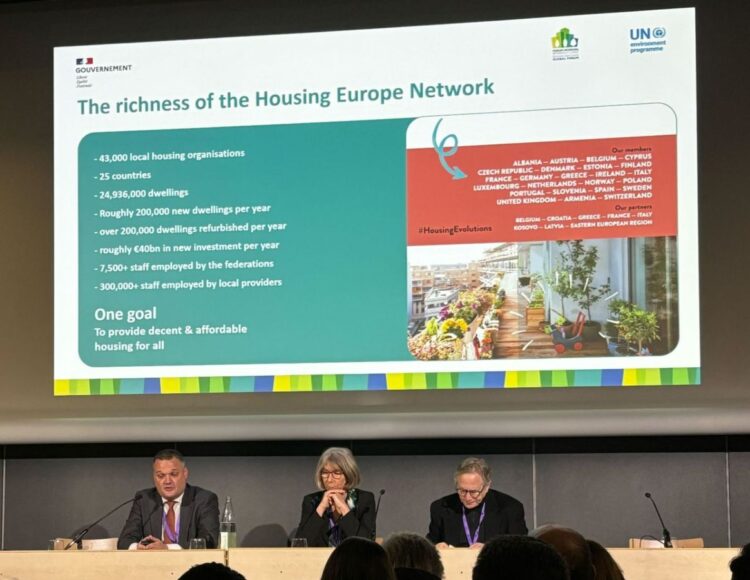The first-ever Buildings and Climate Global Forum was the pioneering initiative by the United Nations Environment Programme and the French Government gathering ministers and key players to initiate a new impetus in international collaboration for building decarbonisation and resilience after COP28.
The political discussions shaping the future of homes continued at full speed and public, cooperative, and social housing was one more time in the spotlight. The Forum revealed recognition from international entities, such as UN-Habitat, the French Development Fund AFD, and the International Energy Agency IEA that the housing and climate crises must be tackled simultaneously. Fatih Birol cited the development of social housing as a key way to ensure that the cost of the climate transition “does not fall on the shoulders of those who can least afford it”.
Decarbonisation as a right, not privilege
Social and affordable homes were recognised as crucial components in the global fight against climate change. Examples from the largest social housing provider, Paris Habitat reported impressive energy bill reductions of 28% achieved through renovation while the head of the French-speaking housing network, Prudence Adjanohoun added that every social housing strategy is focused on innovation and greening. Dutch social housing companies united by AEDES gave examples of the Netherlands’s mission to get off the gas grid by 2035. Witnessing the results firsthand, the French Agency for Development said it sees social housing as pivotal in the systemic approach to decarbonising our living spaces and that lessons from Europe can be useful elsewhere. Grzegorz Gajda from the European Investment Bank (EIB) and OECD’s Soo-Jin Kim highlighted how essential finance, solid governance, and addressing the urban dimension are when we are tackling climate change. Soo-Jin cited a number of success stories in the field of renovation, revealing that most are driven by solid public, social, and cooperative housing providers.
Unlocking the power of sufficiency
Sufficiency is all about resource efficiency, delivering renovating and using homes within the planetary boundaries, as well as making the best out of technologies and resources to deliver well-being for everyone. Sufficiency is not just about carbon, but also the wise use of materials and land is crucially important. Calculations show that up to 5% of the CO2 emissions can be reduced by 2030 if we maximise the sufficiency potential at global level. Striking enough, in the EU, the reduction of CO2 could be up 30% less, but at the moment, no EU policy is tapping into this potential. This is why IPCC called on governments to launch a global political coalition on Sufficiency First for future generations to live well on our planet.
Robin van Leijen who is in charge of EU affairs at Aedes the Dutch social housing federation member of Housing Europe, and also a Chair of Housing Europe’s member group on energy and construction matters shared insights into the commitment of public, cooperative, and social housing sectors to go beyond efficiency and renewables. Using the example of Parkwest Dublin, where a life cycle assessment showed a 62% reduction in emissions compared to new builds, he highlighted the importance of incorporating efficiency into development projects.
On day 2, Sorcha Edwards, our Secretary General, insisted that a paradigm shift for housing is needed: public, social, and cooperative housing should be considered as the backbone of the housing system. Today, 46% of tenants from the private rental market feel at risk of losing their home in the EU. In contrast, the not-for-profit sector is already addressing this issue and providing a security of tenure. Sorcha also reminded that housing that is left to the market leads to speculation and homelessness while homes must be viewed as essential public infrastructure.

